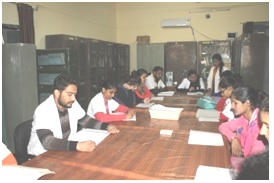

"Libraries store the energy that fuels the imagination.”
College library stimulates the students to obtain, evaluate and recognize knowledge and to familiarize them with the trends of knowledge for further education and learning new disciplines. The college library has about 1, 50,000 books classified and indexed. It offers good reading material in the form of books, periodicals, encyclopedias, magazines, newspapers etc. The college library is enriched with rare collection of encyclopedias, biographies of eminent personalities, historical printed books. The library is situated in a separate independent building which includes two reading halls, one reference room and one room with computer facility. The whole library is facilitated with Wi-Fi network and is completely automated.
Government Dungar College, Bikaner gets its e-Vaachnalya, a serene and well-maintained space dedicated to reading, learning, and intellectual exploration. Designed to promote focused study, it offers a calm and quiet environment away from the bustle of daily campus life.
Students have access to a wide collection of textbooks, reference materials, magazines, and newspapers. The e-Vaachnalya also supports competitive exam preparation by providing relevant resources and peaceful surroundings for deep concentration.
With comfortable seating, good lighting, and an atmosphere of academic discipline, the reading room plays a vital role in nurturing curiosity, self-learning, and thoughtful reflection.
The e-Vaachnalya is more than just a room — it is a space where ideas are born, knowledge is shared, and students grow into lifelong learners. It stands as a symbol of the college’s commitment to academic excellence and a reading culture.
 Central Labs
Central LabsWhile lectures are fantastic for laying down the groundwork for a subject, the hands-on experience you gain in a lab is crucial.Laboratories are meant to be learning spaces.A college lab gives you the opportunity to solve problems and conduct experiments with real-life applications. Putting your knowledge into practical action is vital for anyone considering a career.The college is well equipped with different laboratories namely Physics, Chemistry, Botany, Zoology and Geography. Other than Departmental Laboratories there are central labs that cater to the specific needs.
 ICT LAB
ICT LABThe Information and Communication Technology (ICT) labs were established in government colleges under Rashtriya Ucchatar Shiksha Abhiyan (RUSA) colleges’ scheme. It provides an opportunity for all college students to develop ICT skills and learn through computer aided learning process. So it is a major catalyst to bridge the digital divide amongst students of various socioeconomic and other geographical barriers.
ICT lab in the Govt Dungar College was established during the session 2018-19. The laboratory is equipped with twenty-five computers with computer tables and chairs. The lab has a LAN connection and all computers are connected through proper networking. It also has two all-in-one printers. The lab also has a mounted LCD projector along with a white screen. In October 2018 MOS training was provided to faculty members and college students by Microsoft India Pvt Ltd under an MOU signed between Commissionerate, College Education Rajasthan, Jaipur and Microsoft India Pvt Ltd. 60 faculty members of different government colleges and 322 students were benefited from this training. A one day workshop on ‘Atithi Bhasha’ was also conducted in this lab on 18-06-19. Twenty five college students participated in this workshop.
The lab has also been used for election related work during Lok Sabha and Vidhan Sabha elections by the District Administration, Bikaner. It is used by college faculty for planning and other works related to university theory and practical examination too. It is also used for work related to online admissions and scholarship. Skill development courses under MMKY scheme will soon start in this lab.
 Remote sensing and GIS (RS&GIS) Lab
Remote sensing and GIS (RS&GIS) LabThis lab is situated in the Department of Geography. The lab specially established for UG, PG students and research scholar to conquer them to modern technologies for research, instruction and "hands-on" training in the areas of urban remotesensing, geospatial information system and image processing. They can utilize these technologies in their research. In this lab open source software like ELWIS (Integrated Land and Water Information System), GRASS (Geographic Resources Analysis Support System) GIS and Licensed software ARCGIS online, ENVI (Environment for Visualizing Images) are available for students.
 Language Lab
Language LabA language lab is a dedicated space for foreign language learning where students access audio or audio-visual materials. They allow a teacher to listen to and manage student audio, which is delivered to individual students through headsets or in isolated 'sound booths.' The Language lab in the college has been successfully training students and helping them develop communication skills. The language teaching-learning software works on 10 computer units and comprises of lessons in grammar, composition, phonetics, listening activities and exercises.
 Rock Section Cutting Lab (RSCL)
Rock Section Cutting Lab (RSCL)This lab is situated in the department of Geology. It has a section cutting machine, a grinding machine and a polishing machine along with a sieve shaker machine. This lab has the facility to prepare thin sections (.03mm) of rock, fossils, and minerals for their microscopic studies and identification.
 Smart Science lab
Smart Science lab
Sports Complex” in the College is now at a stage of completion and would be a very good addition to the sports facility. It includes Multipurpose Indoor Hall of size 60X40m, Volleyball Court of 24X17m and Basketball Court of 30X17m (with portable Goal unit), all of high international standards having synthetic (acrylic) surface laid over an Asphalt base, along with proper Referee Chair.
Hostel facilities are embarked in such a way, that the students can feel homely and pursue their studies in a serene environment. Girls’ Hostel was established on 2014 to meet the demands of the Girls Students of the college coming from distant rural places of the district. The College provides separate hostel facilities for girls and has all necessary facilities for boarding and other recreational activities, to support goodwill, sociability and to play essential role in promoting community living among them. The hostel is located within the college campus in a healthy and secured environment. It has easy access to Bus, Railway Station. The hostel had a single block with 35 well furnished rooms having total seat capacity for 70 boarders.
Facilities
Wi-Fi enabled hostel.
RO water for drinking and cooking.
Modern kitchen with dining hall.
Tasty and Hygienic food.
24*7 medical facilities with Visiting doctor
Solar water heater.
Sports and leisure facilities.
Newspaper and Magazine facilities.
35 furnished rooms (cots, tables and locker facility).
Occupancy ratio of 2:1.
Sanitary Napkin Vending Machine
Meditation Room
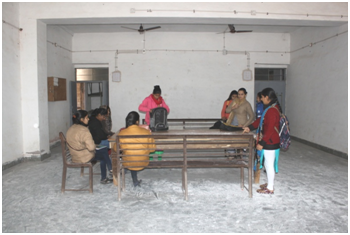
GIRL'S COMMON ROOM
To facilitate our female students, the Campus has established a spacious and comfortable common room, which is in college main building. This space has been designed to give female students a place to relax, study, have informal discussions in free time available. College has a provision for Girls Common Room where the girl students may sit, rest and go for recreation. Measuring 25’x50’ ft. this room is equipped with drinking water facility, a water cooler fitted with water purifier, an attached washroom with Sanitary Napkin Vending Machine, elegant furniture, indoor games, electricity, CCTV and Wi-Fi enabled etc. The room is properly ventilated, well- lit, neat and clean to provide a friendly ambience to its users. Daily newspapers, magazines, periodical and journals are available for leisure reading.For any emergency situation contact numbers of Vishaka committee members are displayed on the notice board of the common room.
Cafeteria is not just the place where you go to eat. Especially in colleges and institutes of education this place is an open arena for debate, argumentative sessions on different issues, cracking gossips, kidding and having loads of fun with tea, coffee and coke in between as gap fillers. The College Cafeteria has been functioning efficiently from a long time.
Owing to the global need of conserving, preserving and reserving natural resources for the future generation, rainwater harvesting is of utmost importance. Govt Dungar College Bikaner situated in the middle of the Thar Desert thus understands the importance of water. Traditionally Western Rajasthan villages have devised their own methods of rainwater harvesting in the form of building tanks, Bawadis, Talabs etc.which caters the need of water for the inhabitants. In cities too rainwater harvesting is done by collecting rainwater from the roofs to be used in each household and each household construct an underground tank to collect rainwater traditionally called ‘Palar pani’. The College has installed rainwater harvesting system on the roofs of two of its building, the main block and science book building .The large surface area of the roof of both buildings collect huge amount of rainwater and through a systematic drainage system it goes directly underground and recharge the land thus contributing in raising the water level otherwise which is continuously going down.
A 120 kV solar panel have been installed on the Vigyan bhawan building. Campus is well lit by solar lights at night.
FACILITIES FOR DIFFERENT ABLED STUDENTS
Ramps have been made at every necessary place to help physically handicapped students.
College provides daycare facilities for children of faculty members of the college.
 Pratap Sabhagar
Pratap Sabhagar
This seminar hall in the college is equipped with the latest Audio and Visual equipment for the conduct of Presentations, Seminars and personality development work shops. It has the capacity for accommodating 250 persons.
 Youth Development Centre (YDC)
Youth Development Centre (YDC)
Youth Development Centre (YDC) is fully equipped with state-of-the-art audio-visual devices providing services such as video conferencing, a sound system and audio-visual material. This seminar hall is used for conducting E-Lectures through e-podium, PPT presentations, extension lectures etc. It has the capacity for accommodating 150 persons.

 Video Conferencing Room
Video Conferencing Room
It is fully air conditioned and sound proof. It is situated in chemistry block in college building. It is fully equipped with audio devices as mike with each seat. It is ideal for video conferencing. It has the capacity for accommodating 40 persons.
 Lecture Theaters
Lecture Theaters
Unlike traditional classrooms, four lecture theaters in the main block bespeak of the architectural vision of Dungar College. In terms of acoustic properties these four lecture theatres have a pitched floor, so that those in the rear sit higher than those at the front.
 Geological Museum
Geological Museum
Prof B.S.Paliwal’s Museum of Geology is one of the best Geological Museums in Rajasthan. The uniqueness of the museum is its vast collection of around 4000, standard size well labeled and displayed geological samples. The samples are collected in the general geological tours, mapping and mining training camps, which are compulsorily a part of M.Sc Geology course. These specimens well represent almost all the major Rock formations of the country. The samples are displayed in wooden and glass showcases. The Museum samples have been classified into different sections:
Rock section: displays all the three rock types viz igneous, sedimentary and metamorphic rock samples representing all possible diversity of geological time and geographical distribution.
Mineral section: representative varieties of all Rock forming minerals, economic minerals are displayed in this section .this section contains a further division of beautiful crystals of certain mineral varieties.
Fossil section: micro and mega fossils of almost all phyllums and classes are displayed in this section.
Structural features section: various structures which have developed in rocks as a result of dynamism of the mother earth have been displayed in this section.
Wall section :the walls of the Museum have been decorated with various charts ,geological maps mineral maps, Tectonic maps etc. beautiful field photographs representing the research work of the faculty and research scholars add to the academic research ambience of the department
This departmental museum is visited by students and faculty of all the geology departments of various colleges and universities of the country who happen to visit Bikaner for their geological field work.
 Zoological Museum
Zoological Museum
State of the Art Zoological Museum in its present form was established in the year 1985 holds a vast diversified collection, all notified to the Forest Department, Govt. of Rajasthan. It beholds quite a few stuffed trophies, skins & hides, animal heads mounted on wooden frames which were gifted to the Department by the then His Highness of Bikaner. It also comprises of animal specimens preserved in the form of wet collection in fixing fluid kept in glass jars which are systematically arranged in glass show cases based on 'Animal Classification' There is also an assemblage of osteological collection which includes Human skeleton and skulls of different animals like Jackal, Hyaena, Horse, Donkey, Camel, Cow, Deer, Dog, Goat, Sheep etc. and other disarticulated skeletons. There are a number of scientific study materials in the form of models too. One such model depicts the evolutionary history of man. Different embryological stages are also kept here to study the developmental process. Dry specimens, especially those of insects are also maintained in the Museum. Beautiful Alizarine preparations showing the stained skeleton within the transparent body of the animal are also a part of the rich collection maintained here. A few fossil types and dried corals add to the educational collection of the Museum. Overall, the Museum with its distinctive features and faunal wealth is one of its kind and worth visiting and appreciating.

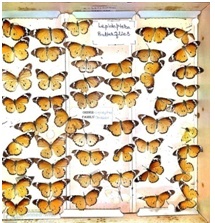
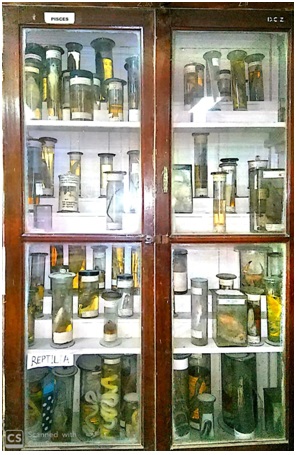
 Herbarium
Herbarium
Herbarium was established in the year 2002 in the department of Botany, Government Dungar College, Bikaner by Dr. Suman Chandra Sharma. This herbarium is one of the largest herbarium in the state of Rajasthan. In this herbarium around 7500 herbarium sheets of plant specimens are present which are collected from different areas of Bikaner Division and other nearby areas. All the sheets are given the accession number by Dungar College herbarium. These herbarium sheets are approved by Botanical Survey of India (B.S.I.) and have been arranged according to Bentham and Hooker system of classification.
This herbarium has sheets of many first time reported species from Rajasthan as well as India. Nonea caspica is a new record for India collected from Hanumangarh District. In this herbarium Ph.D. scholar Ramesh Kumar Agarwal and Chandan Singh Rajpurohit found a new record of grass species from Rajasthan and they dedicated its name as variety to Dr. Suman Chandra Sharma i,e Acrachne racemosa var. Sumanensis. In total one new record is from India and eight are from Rajasthan.
Herbarium is well equipped with important taxonomic tools such as plant press, Vasculum, digging equipment etc. which are used in the field. In this herbarium floras of different regions and books of taxonomy are also present.
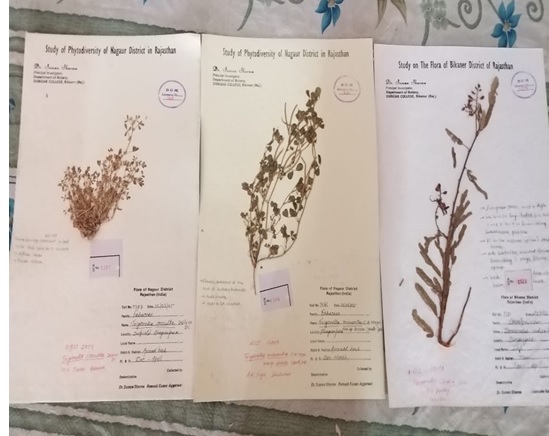


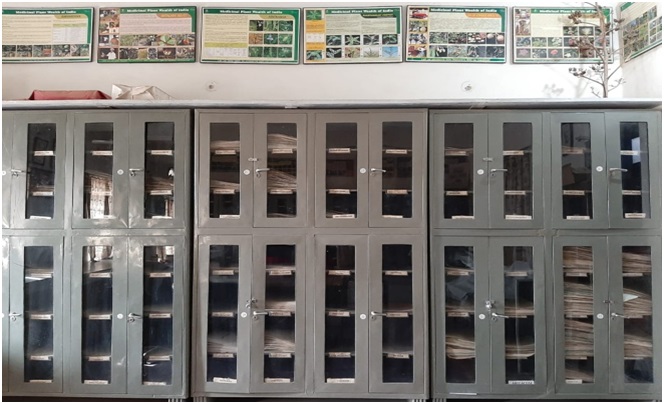
BOTANICAL GARDEN
The Botanical Garden in Dungar College is spread over 120x55 feet approximately. This garden has many species of Angiosperms and Gymnosperms. Cycas is well established Gymnosperm in this garden which grows in The Himalayas. Almost 85 species of Angiosperms can be seen in this garden. Out of them 26 species are of trees, 20 species of shrubs and around 39 species of herbs, grasses and climbers. Most of the plants are used in practical works for UG and PG. Students.
Some plant species have medicinal values such as Terminalia arjuna (Arjun), Tinospora cordifolia (Giloy), Asparagus (Shatawari), Withania somnifera (Ashwagandha), Moringa oelifera (Sahjan), Barleria prinoites (vajradanti), Aloevera etc. Some important weeds and grasses also grow in this garden during different seasons.
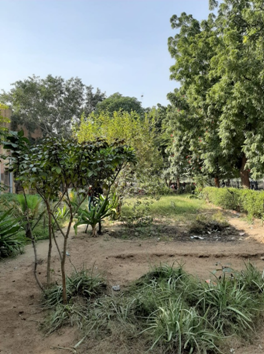
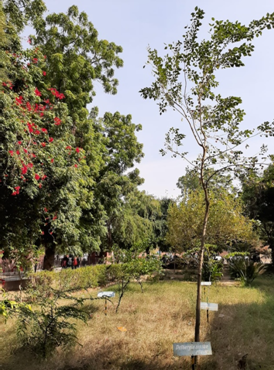
 ANIMAL HOUSE
ANIMAL HOUSE
The Department of Zoology is registered with Committee for the Purpose of Control and supervision of Experiments on Animals (CPCSEA) New Delhi (registration no. 1066/GO/Re/S/07/CPSEA) and has its own Institutional Animal Ethics Committee (IAEC).
The institutional animal ethics committee (IAEC) is functional according to guidelines laid down by CPCSEA and the institute policies.
Animal house facility is well developed and maintained infrastructure with controlled environmental conditions for housing and management of experimental animals.
The available animals are being cared for by well qualified and experienced staff.
All animals are procured from Govt. approved suppliers according to prescribed guidelines of CPCSEA.
The adult healthy male Swiss albino mice (6-8 weeks old) are procured from Lala Lajpat Rai University of Veterinary and Animal Sciences, Hissar.
The experiments are conducted under the supervision of IAEC of the College. The animals are housed in polypropylene cages and maintained on balanced mice feed and tap water ad libitum.
They are acclimatized to laboratory conditions before use. Occasionally tetracycline water is provided as a precaution against infection. The temperature of the room is maintained between 22-27ºC.
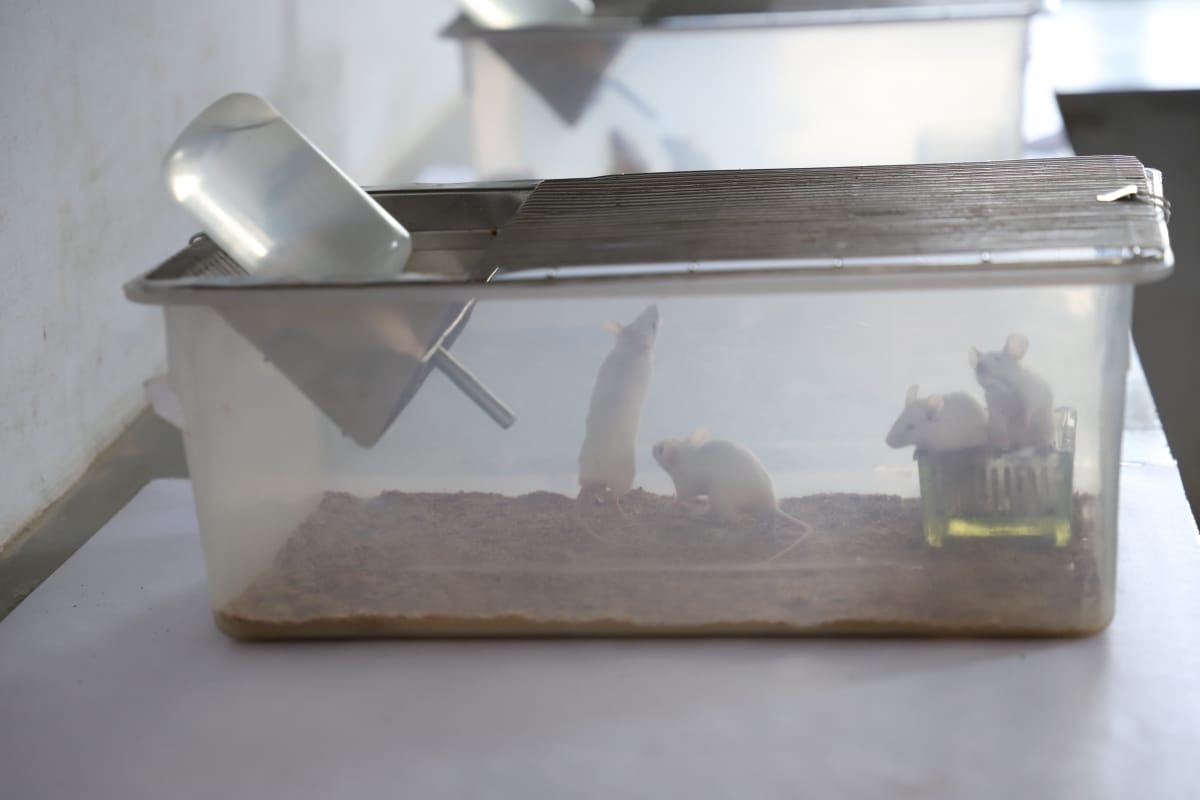
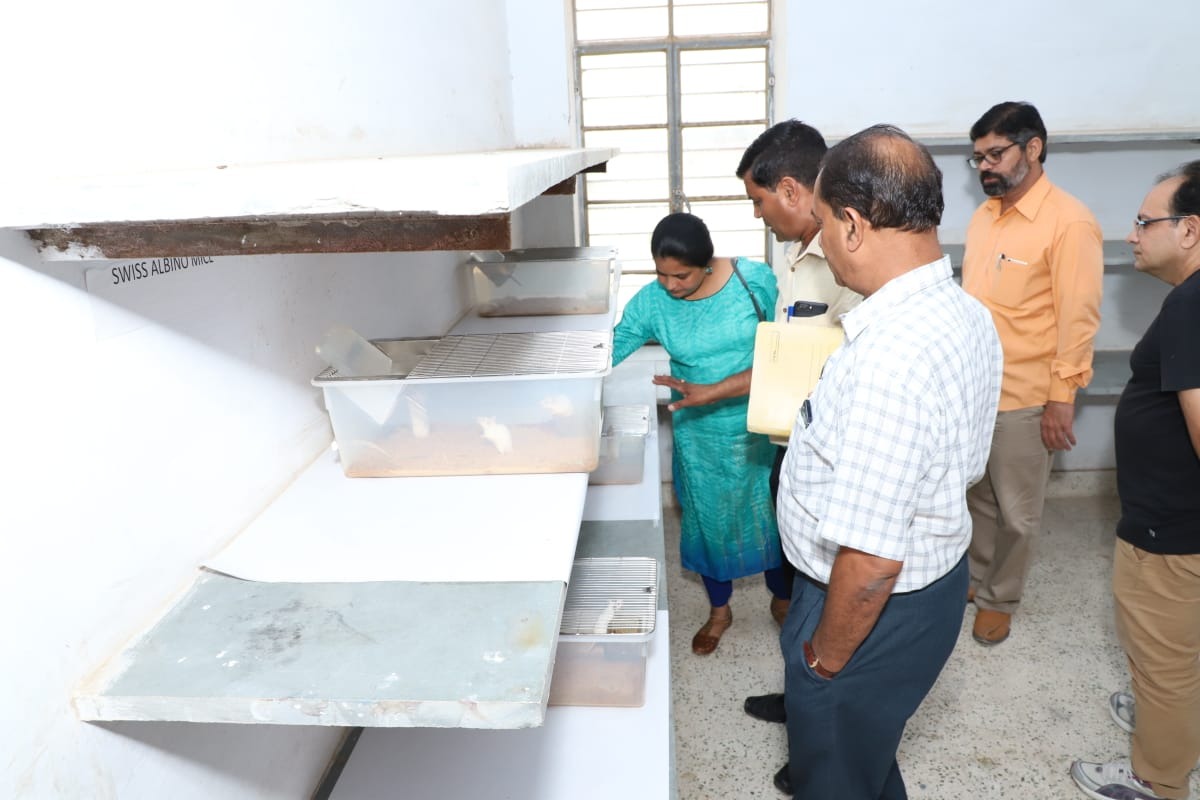
 return
return
Constitution Park on Campus: Where the Constitution Breathes!
It’s not always easy to feel the Constitution. For many, it’s a textbook topic, a formality to memorize for exams or quote during national celebrations. But something different happens at Government Dungar College, Bikaner—something quieter, more personal. Here, within the campus, the Constitution Park doesn’t just tell you about democracy. It invites you into it.
Key Highlights
Surrounded by shaded walkways and blooming trees, the park doesn’t shout. It doesn’t need to. Panels placed along the path introduce you to the Preamble, Fundamental Rights, and Directive Principles. Not in a mechanical, preachy way—but simply, as if saying, “Pause here. Think for a moment.” Some do. A student might sit under the tree, read aloud.
Dr. Ambedkar is not just commemorated here—he’s present, somehow. Students refer to his vision not just in assignments, but in conversations, especially during Constitution Day or Republic Day gatherings. And these gatherings aren’t ceremonial parades. They’re conversations. Reflective.
Role In Campus Life
Interestingly, no one is forced to engage. Yet many do. The park has become a spot for debates, for quiet reading, for curious detours between classes. It's peaceful, yes—but not passive. It nudges. It offers space for the Constitution to be something lived, not stored.
Of course, no park can single-decker revive democratic awareness. But this one does something subtle and necessary: it makes the Constitution feel nearby. Not locked in courts or archives, but present—beneath the trees, beside the benches, within reach.
Maybe that’s what civic education needs more of. Not more noise. But more spaces like this. Spaces that don’t command attention, but create room for reflection. For questions. For possibility.
 return
return